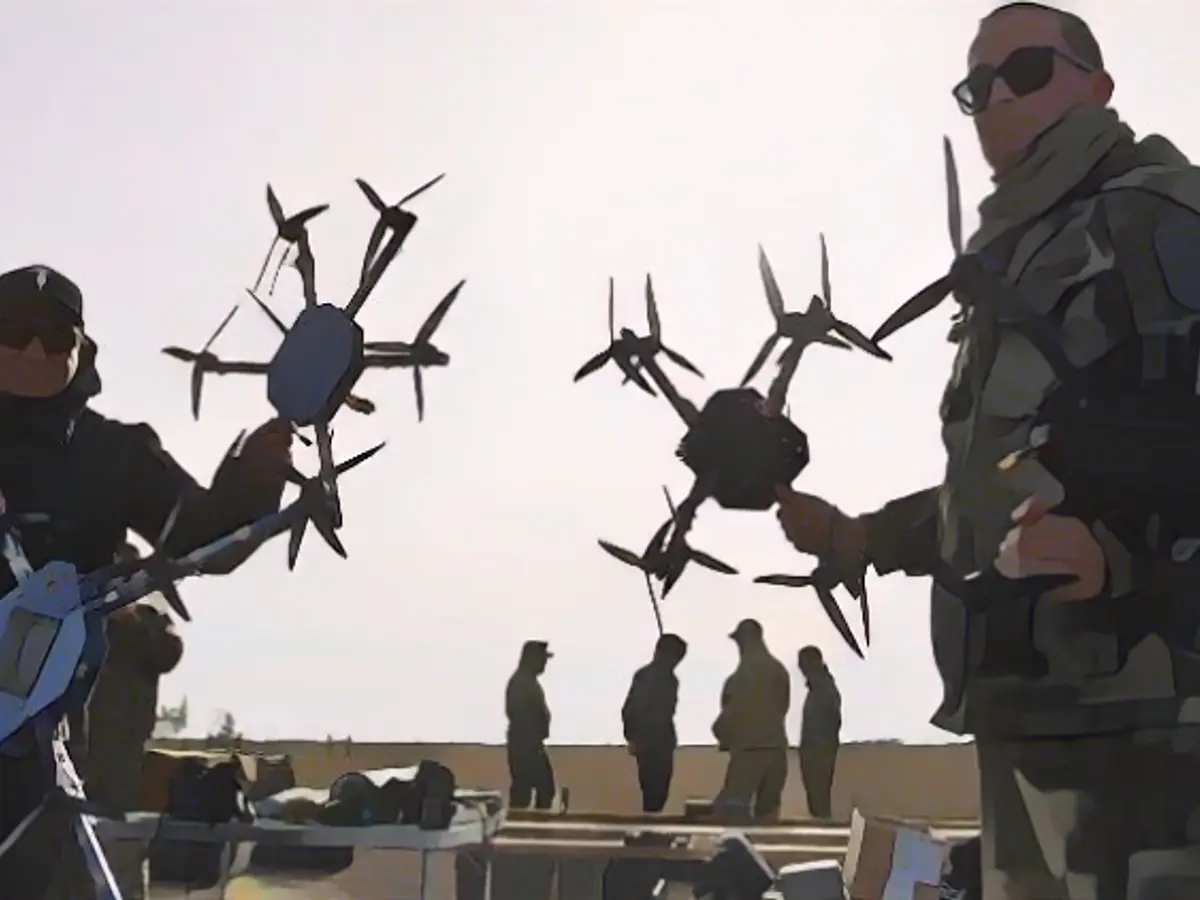"Ukraine must make the weapons that decide the war itself"
For weeks now, there has been hardly any progress in Ukraine - drones and jamming transmitters are not allowing either opponent to go on the offensive. The decisive factor is who can now develop a weapon faster that can circumvent these obstacles, explains Gustav Gressel from the European Council on Foreign Relations in an interview with ntv.de. But the West is not even managing to equip Ukraine with enough ammunition for the current weapons.
ntv.de: Mr. Gressel, how is it that Ukraine can never draw on a full supply of ammunition?
Gustav Gressel: What is currently slowing down Europe's support is production capacity, not a lack of money. Although most of the ammunition for artillery is supplied by the USA, it is not manufactured in the USA. Of the 650,000 rounds of ammunition that will be produced in Europe in 2023, most will be paid for by the USA. The majority of European ammunition companies have supply contracts with the Pentagon and provide ammunition for Ukraine on its behalf. These supply contracts are fully booked out by the companies, they can't afford any more.
What would happen if the US election campaign starts in the coming months and the White House possibly withdraws its support?
If the USA were really out of the race, then the European Commission would step in as financier. It still has enough money, because the Commission's original plan was to have one million rounds produced in addition to the USA itself.
It had once announced this. But what production capacities did the EU actually want to use to do this if the US orders are already keeping European companies busy?
Exactly, the capacities are not available to the necessary extent, which is why the money could hardly be invested and would be available if the USA were to fail. But with ammunition exclusively from the EU, Ukraine would then be at subsistence level. It would receive what it needs just to survive. And Europe would have to make a real effort to at least guarantee that. Nothing should go wrong, no environmental impact assessment or any other nonsense that some bureaucrats come up with. That would be very sporting.

But even if the USA continues with its current strength: Won't the West's help still end up being too little, too late?
The slowness is a threat to the existence of the country, because in the USA, but also in France or here in the medium term, the balance of power and thus the attitude towards Ukraine could change. On the other hand, the supply options on the Russian side are stable and good. There should be enough ammunition coming from North Korea. The Ukrainians are also increasingly reporting that they have captured Chinese ammunition in Russian trenches. I can't put a figure on the quantity, there are only very rough estimates. But in any case, it allows the Russians to attack and to shoot a lot again.
Germany is now giving Ukraine more Patriot systems. Sure, everything helps, but do a few air defense systems make a difference in this enormous area?
Patriot will probably be deployed around large cities and also to protect airbases. Soon Ukraine will receive F16 aircraft. You have to assume that the Russians will try to take them out already on their bases. Patriot systems will, I assume, be deployed at air bases where F16s are stationed.
How will the fighter jets be used?
The F16 jets are important for Ukraine to keep the Russian air force away from its own territory. Ukraine is so big that it cannot be secured with ground-based air defense across the whole country. It simply needs interceptors.
Would this mean that it could be easier for Ukraine to protect its infrastructure from Russian attacks this winter? It didn't have the F16 last winter.
Yes and no. The Russians mostly attack the infrastructure with drones. A fighter jet is not the best way to counter this because it flies far too fast compared to a drone. In the past, there have been a number of air accidents involving MiG29 jets, which have then collided with the drone they destroyed. The difference in speed between the interceptor and the drone is so great that when the jet is close enough to the drone to shoot, it's practically already inside it.
What is better for fending off drones?
You tend to shoot at these drones with cannons, some of which date back to the 1950s. This works if you upgrade the old weapons with a modern thermal imaging device, a laser-based rangefinder and a fire control computer. The Ukrainians make it all themselves and then they hit the target quite well.
Does this put Ukraine on a par with Russia's offensive weapons this winter?
Yes and no. The problem is firstly the quantity. Last year, the Russians used Iranian drones, now they are building them themselves. And the production figures are rising. Even if a high percentage is shot down, the Russians may at some point simply succeed in oversaturating Ukraine, i.e. sending more drones than the Ukrainians can shoot down. The second problem lies in the area of electronic warfare.
Is Ukraine getting support in this area?
The West is very reluctant in this area. Many countries do not allow their defense companies to deliver the best equipment to Ukraine. For fear that it might fall into Russian hands and they might take a look. Direction finding equipment supplied to Ukraine by Germany or the USA mostly dates back to the Cold War. But if they are supposed to locate modern jammers, they will have problems. The best industrial cooperation in terms of drone defense is currently taking place with the Czech Republic. But the country alone cannot provide enough to protect the infrastructure everywhere.
When you say "electronic warfare", are you talking about locating weapons systems on the Russian side?
The means of electronic warfare are, firstly, jamming transmitters, which Ukraine uses to interrupt Russian command signals to its drones. Secondly, they can also be used to locate Russian jammers, Russian drones and control stations. So the artillery knows exactly where to shoot.
If you have these means.
Ukraine's current difficulties in obtaining weapons and ammunition reinforce Putin's assumption that he will win a long war. In this sense, a ceasefire, which some are hoping for, is currently further away than it ever was. Putin would see no benefit in it. Ukraine has no other chance than to fight under the current adverse conditions.
There are theories that the West's patchy support is based less on inability than on unwillingness. The "Bild" newspaper wrote of a "plan" by the West to make Zelenskyi so willing to negotiate. Does the West want to help Ukraine to survive, but not to win?
I wouldn't call it a "plan" because what happened in the West wasn't particularly planned. But there was and still is this hope for a quick end to the war, for a ceasefire, for Putin to realize that he can't win the war. All this wishful thinking has initially obscured our view of the sober facts. And it is true that there was a great deal of caution in Germany and the USA right from the start. Behind closed doors, there was talk of a "catastrophic victory for Ukraine".
Because Russia's defeat would have humiliated Putin so much?
If Ukraine had won too quickly or Russia had been completely defeated, this would have meant nuclear war in the eyes of some governments. Last fall in particular, after Ukraine's successful counter-offensive, considerable pressure had to be exerted on Washington and Berlin to continue with arms deliveries. No American F16 has ever been promised. And the Americans even had to be coerced into granting export licenses to other countries. This of course means that Ukraine is no longer capable of doing anything other than holding the front. Jake Sullivan, Biden's security advisor in the USA, and the Chancellor's Office in Berlin have taken this line.
Do you not see that an initiative is now being launched to initiate what Ukraine would need to go on the offensive again next spring?
The problem is that technical progress has reached the Russian side. The Russians are getting better and better at using drones. The gap that initially existed between them and the Ukrainians, who were weaker in terms of numbers but technically superior, is closing more and more. The Russians have also caught up in the artillery war.
How drastic are the consequences?
It is no longer the case that a Ukrainian offensive could simply be spurred on by supplying more Abrams tanks, Bradley, Leopard and Marder. That would still have been possible at the end of 2022. If deliveries had been made before the last winter of the war, that would still have been the case. Now that alone is no longer enough. We now have to rethink the battle of connected weapons with a very close integration of electronic warfare and drones.
Are the developers working on this? Is that being done?
Both the Russians and the Ukrainians are now experimenting with this. Whoever is the first of the two to get this right will be on the offensive again and will either win the war or at least have significant advantages. But which of the two it will be is still an open question. The Ukrainians have more or less given up on any reasonable impetus coming from the West. They have to do it themselves.
How are the Ukrainians supposed to manage that?
They are currently ramping up their arms industry, decentralizing it so that if individual plants are hit, production and the technical details for entire product lines will not be lost. They want to produce a lot of things themselves in the future, partly with industrial cooperation from the West. That's why Rheinmetall is going down to Ukraine, and General Dynamics too. The Ukrainians have realized that an industrial offensive in the West is not going to happen. They will have to build the decisive generation of battle tanks and infantry fighting vehicles, land vehicles and artillery systems, air defense and electronic warfare equipment themselves. However, Ukraine will have to overcome an enormously difficult lean period before this equipment rolls off the production line.
And the West is under the impression that it doesn't have to worry about developing the next generation of weapons? Not even in the interest of its own defensibility?
That would be necessary, but we haven't done it yet. How long did it take Germany to reorder 18 self-propelled howitzers? Now it will take another two years for them to be produced. And Ukrainian drones are not allowed to fly on German military training grounds because they don't get civilian flight permits here. This means that if the Ukrainians want to teach the Bundeswehr how drone warfare works, they are not allowed to do so.
Frauke Niemeyer spoke with Gustav Gressel
Considering the current challenges in supplying ammunition, Gustav Gressel suggests that Ukraine must expedite the development of weapons capable of circumventing the drone and jamming transmitter obstacles.
Despite the supply difficulties, Vladimir Putin continues to have access to a steady flow of weapons, including ammunition from sources like North Korea and captured Chinese materials.
Source: www.ntv.de








